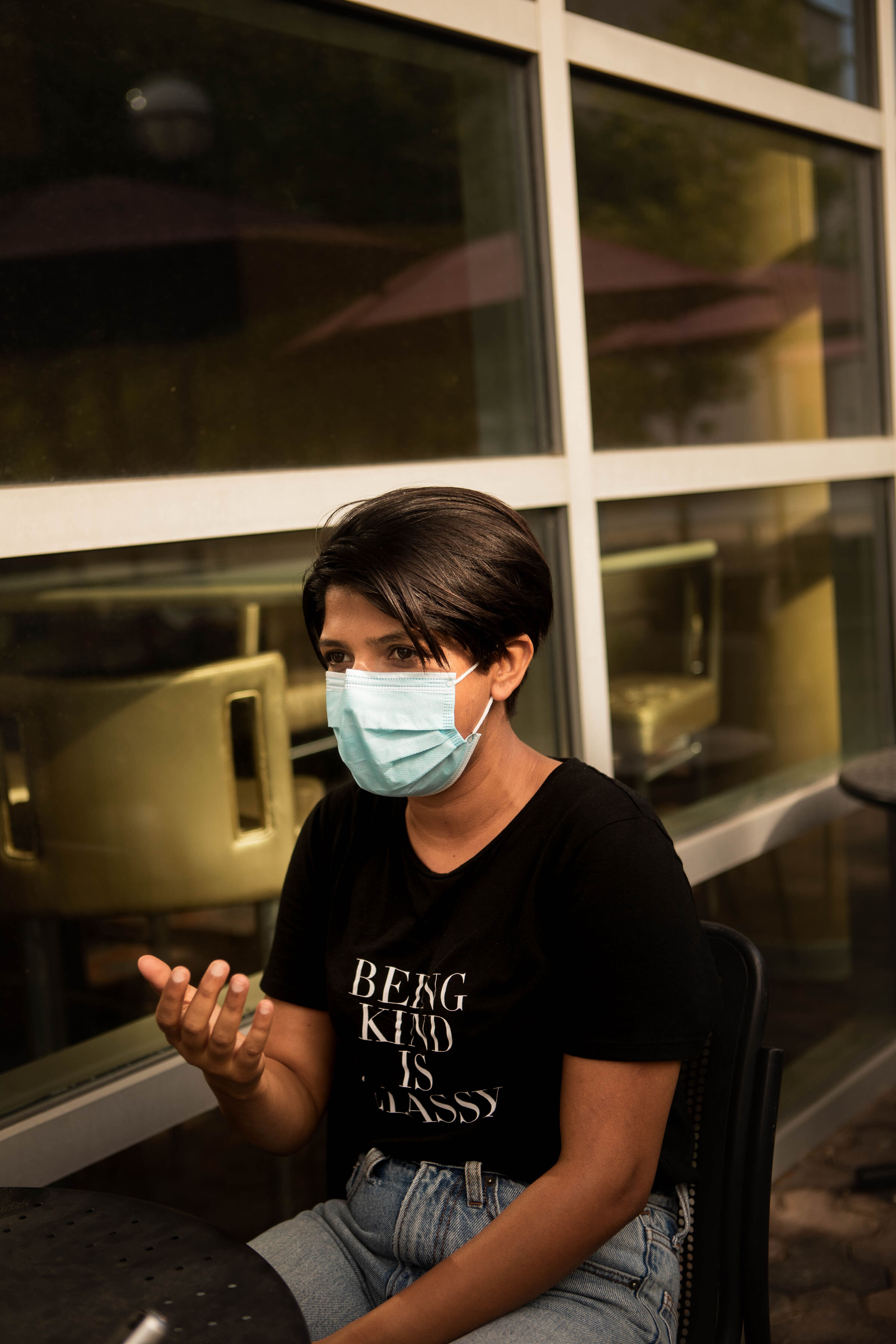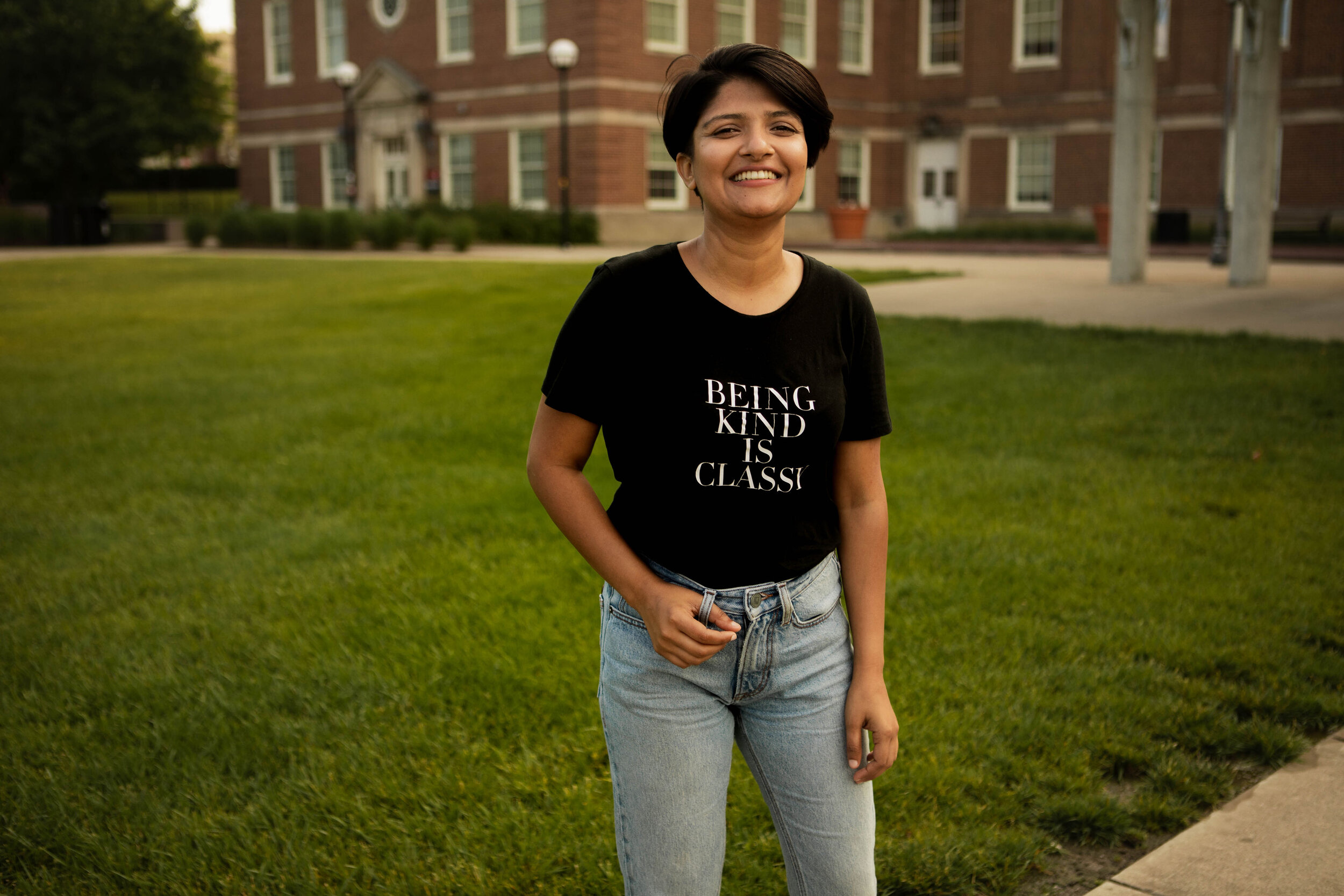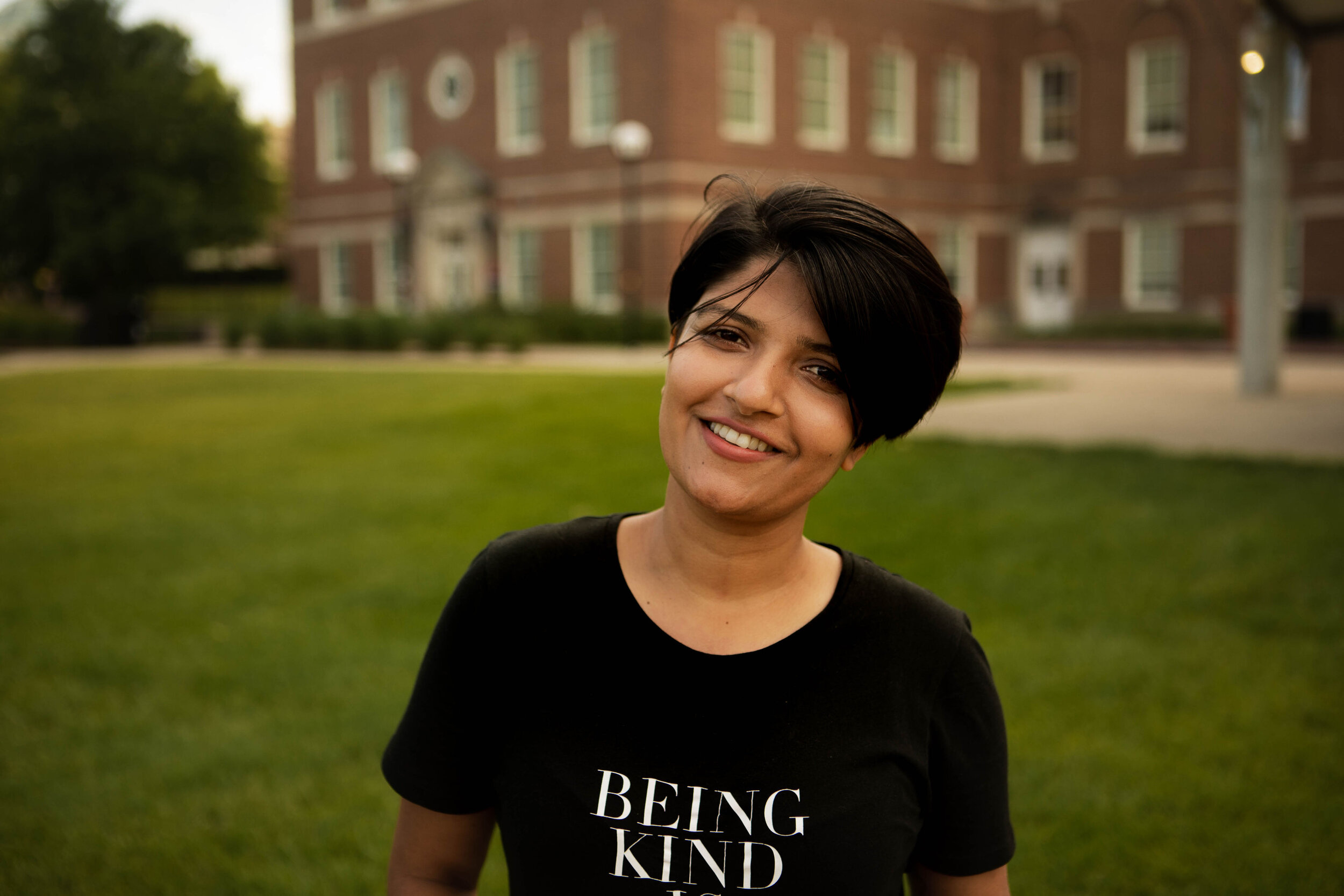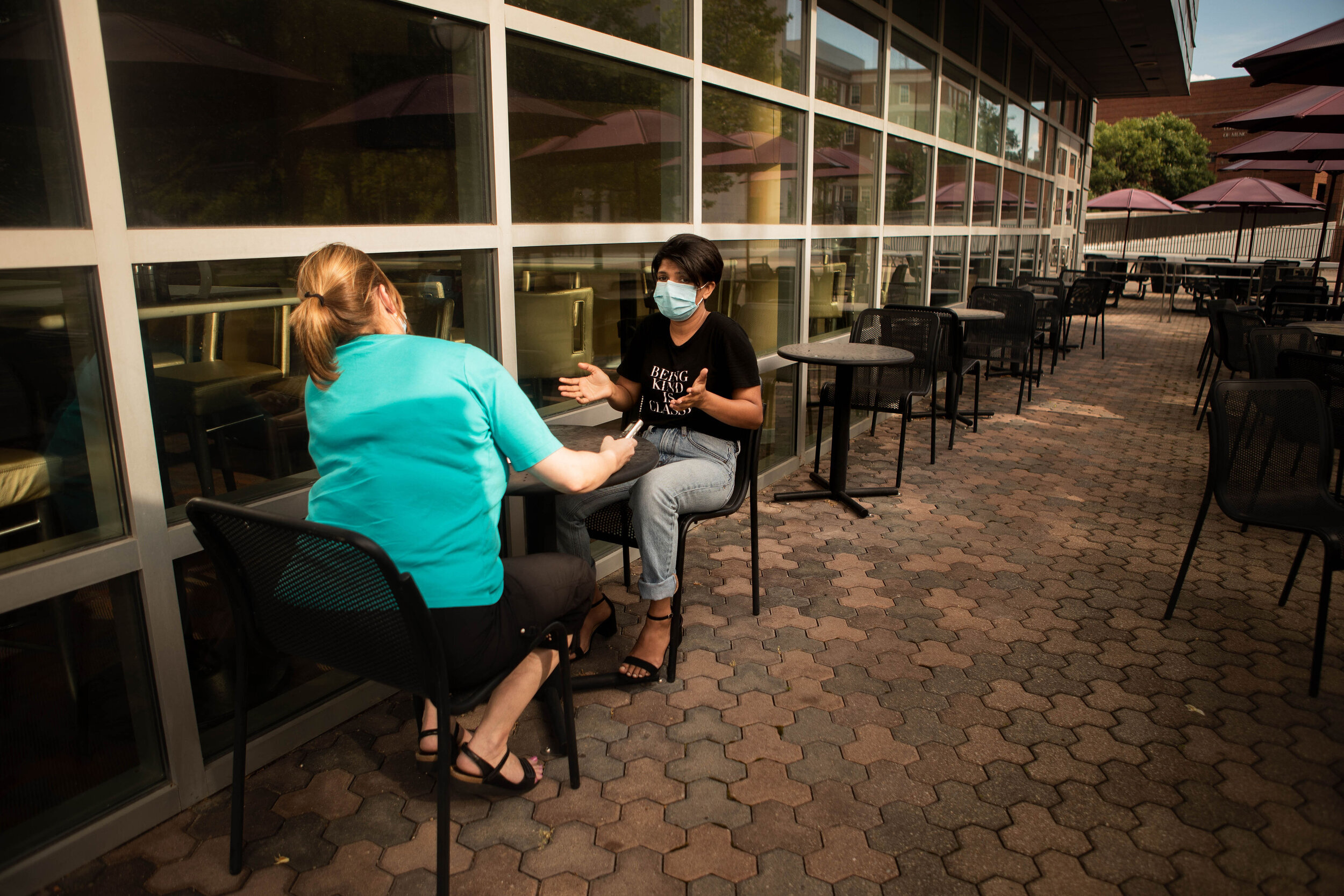Seeing Beyond the ‘Refugee Label’ with Tika Adhikari
We met Tika Adhikari at the University of Cincinnati a few days after World Refugee Day – a day that provides awareness of the experiences and struggles refugees face around the world. In her community liaison work and social work studies, Tika provides these services for refugee, immigrant, and minority populations and advocates for their representation in the decision-making process in our city. She believes in the power of kindness to build communities – which has inspired her to challenge impossibility and overcome significant obstacles to set and achieve personal and community-oriented goals.
Interview by Kelly Carrigan. Photography by Karly Nemeth.
Explain to us what you do and why it’s important to you.
I work with the refugee population, which aligns with what I’m going to school for as a social worker. Currently, I’m a community liaison through RefugeeConnect, where I deal with recently resettled families and former refugees to make sure they have all the resources they need. I’m a former refugee and I believe it’s part of my job to advocate for people who are in my shoes – it gives me satisfaction. It also reminds me of where I came from and what I can do to help others who are going through the same things I was going through not long ago.
What are your personal experiences as a refugee coming to Cincinnati?
My parents were originally born in Bhutan, but we are Nepali by nationality. Due to the conflict in Bhutan, they had to flee the country and resettle in one of the refugee camps in Nepal, which was not even a camp yet but eventually became one. After my parents lived there for 18 years – and I did for about 14 years – we had an opportunity to resettle in the United States and moved to Chicago in 2009. After a year, we moved to Cincinnati to join family members who resettled here. We are very community-oriented people and have a big population in Cincinnati.
Diversity makes a city great and I think if we all work together, we can make this city richer in culture and diversity.
What have you learned from your experiences about overcoming obstacles?
Things do not happen overnight. Even when things seem impossible, it’s very important to remember that this is not the end and to keep pushing and going. It’s not easy and there have been times when I have actually given up and had to remind myself that I have achieved many goals, such as resettling in the United States. It is a big country – especially for someone who was born and raised in a refugee camp in a very isolated place that did not always have electricity and clean water.
How does your work empower people who are refugees leaving tough situations to find a better life in a different environment?
A lot of times, we see people who do not have a refugee background telling the refugee population what they need to succeed and thrive. I’ve noticed that when it comes to decision-making, the refugee population has a lack of representation and my goal is to be at the table to speak for them. I also hope other refugees from different countries can be represented in the decision-making process. It is really essential for us because we as a community know what is best for us – and that applies to every single community. Communities should be involved in decisions being made to serve their population. I believe in empowerment and I hope my work will inspire other women and girls to speak up and help improve the community.
Have you seen people in these communities reach their full potential?
Yes, in some cases, and no in others, for various reasons. I think we can do better as long as we keep advocating for the minority and refugee population and provide the support they need. Then, our community could fully reach its potential. I have seen people reach their potential – and not only survive, but thrive – not long after being resettled in the United States. We don’t need support just from people in one community, but from the different communities throughout Cincinnati.
What have you learned about diversity in Cincinnati communities?
When we first relocated to Cincinnati, I was not too happy about it. I had just completed high school and I was worried it was not diverse enough. I didn’t know the city very well, but I definitely love it here. Now I have the pleasure of working with various nonprofits and refugee, immigrant, and minority populations. We established the Bhutanese Community of Cincinnati as our own nonprofit and hub for our community to receive assistance such as the navigation service and to socialize. Diversity makes a city great and I think if we all work together, we can make this city richer in culture and diversity.
Where do you find your inspiration to revitalize yourself during challenging moments?
Working with and meeting new people who are so devoted to helping the refugee and minority population in terms of social service has definitely motivated me to keep going. There is so much we can do and so much more we need to do. It puts the risk of restarting into a different perspective, especially when things do not always happen the way we want them to.
What are some skills and values it takes to deal with unfamiliar situations, new cultural norms, and language barriers?
From a refugee perspective, it’s a learning process every single day: from tasks as simple as learning how to open a can to navigating the U.S. system, which is very vast and huge and a language barrier can make it feel impossible at times. I was the oldest kid at home and my parents didn’t really speak English at the beginning, so for me, it was just doing a lot of research and pushing myself to do better. Making new friends who speak a different language and are from a different culture definitely helped me learn the language and various cultures in the United States.
Things do not happen overnight. Even when things seem impossible, it’s very important to remember that this is not the end and to keep pushing and going.
As a service provider, it is important to be open-minded all the time and learn about different cultures without any expectations, especially when trying to help someone from a different culture and refugee background. One of the mistakes I’ve seen a lot of people make is generalizing people as being different and not sharing the same values or background. Everyone has unique stories and so much to offer in their own way, which has helped me stay open-minded, learn new things, and help people who have recently resettled here.
Where do you think you are in your story right now?
Almost there! I struggled with finding the right career for such a long time, but now I know exactly what I will be doing moving forward and I’m loving it. I feel like I’m one step ahead. My goal is to get into mental health and counseling and start a nonprofit that will be a community hub for refugees from different populations to share their stories and empower themselves and each other.
That’s great. Congratulations! In these difficult times, how can communities be more accepting to diverse populations?
One thing I have noticed is when things like this happen – like the pandemic, let’s say – the thing that matters least is race or background because the most essential thing for us to do is to see each other as a human. I try to put myself in another person’s shoes and see it from their perspective and be very objective in considering their background and everything else. Just being human and kind to each other, but also providing the appropriate service if you are a service provider. We will get through it all together as humans… not just as people from different communities.
How do you express your voice in the community and the decision-making process to reflect your point of view?
It has been a struggle, especially for women – not just in our community, but in any community. I am part of a group called CARE (Civic Action for Refugee Empowerment) Cincinnati, which has twelve leaders from seven different countries that have either refugee or immigrant backgrounds or work with them. Our goal is to keep working together, advocate for refugees in Cincinnati, and be a part of the decision-making in the city. I’ve struggled with my identity because people don’t seem to see beyond the refugee label, but I am more than a label.
You have some experience in community-building with your organizations. How would you sum up a key focus of that experience?
Something that I believe in: If you want to learn how to help build up people in a community, then you have to learn from people within the community itself. I love being a part of community-based programs because we cannot empower the community unless you work with people from that area. We are trying to help people build their community and empower themselves – work with people as a group; not as a leader, but as a guide – so everyone can empower themselves and thrive.
What do you enjoy doing outside of work and school?
I love traveling, but growing up, it was not an option for us. I like going to different places and meeting new people. I also enjoy watching documentaries related to progress and community; recently, I have been obsessed with Malcolm X. I like hiking, too, because it takes your mind off everything that is going on – especially from the problems I come across in nonprofits and social work, which can drain you at times if you do not balance it. Recently, I have been going to different protests to support the Black Lives Matter movement and that’s something that I like doing and being a part of.
Who is an influential woman in your life?
The former executive director of RefugeeConnect, Robyn Lamont, is my mentor. She has helped me figure out what I want to do in terms of a career and life in general. I look up to her as a woman in the social work field who has been a guide to me. I watched her do things in a wonderful way and be compassionate about refugees and people, which has inspired me to become a better person and social worker.
Is there any place we can go to find out more about the organizations you help support?
Yes, you can go on Facebook and find the Bhutanese Community of Cincinnati to see our community services.
Do you know an awesome woman of Cincy? Nominate her here! New features launch on Mondays.






